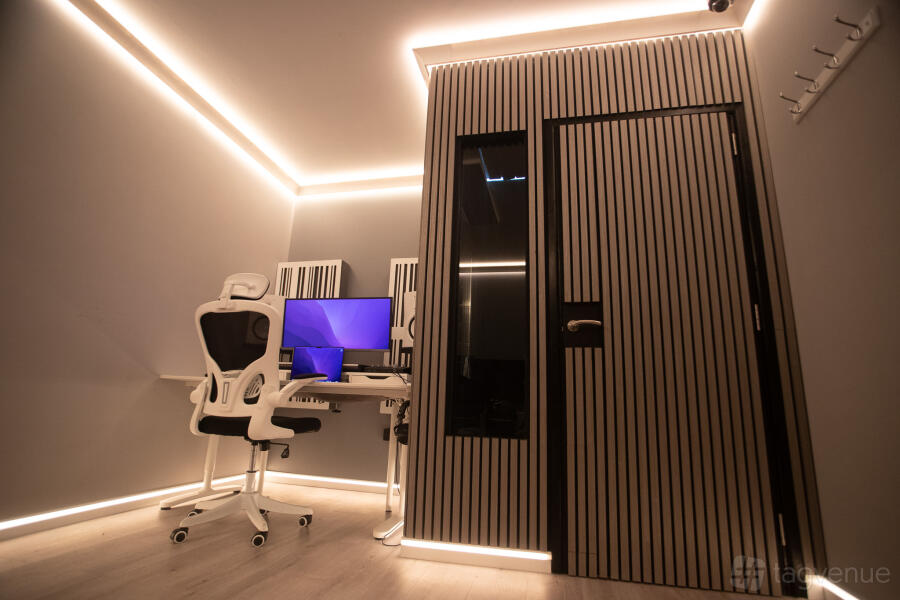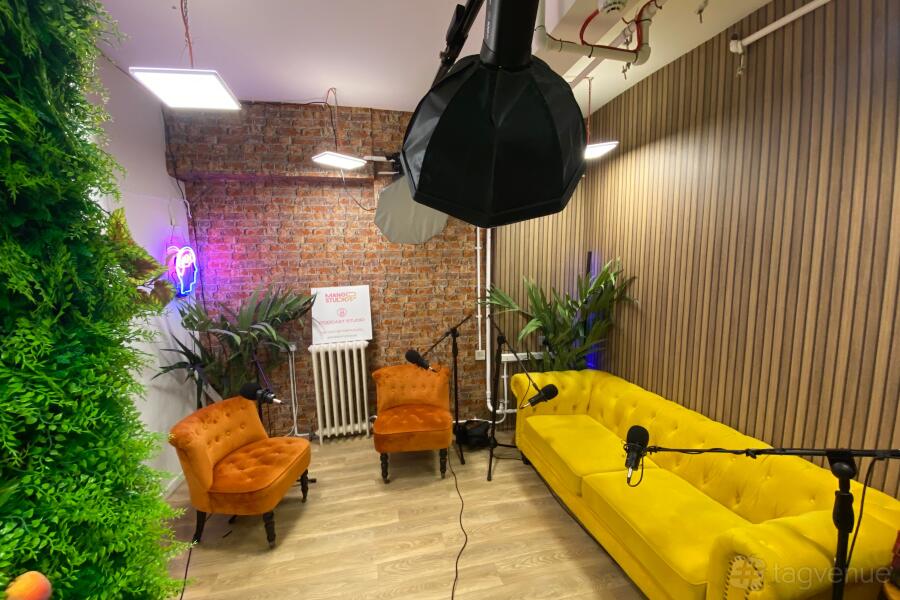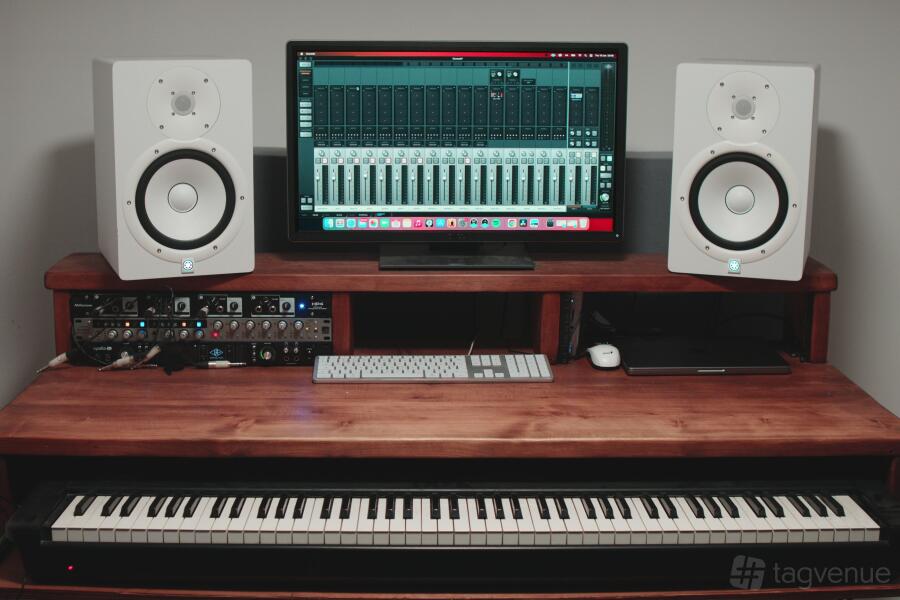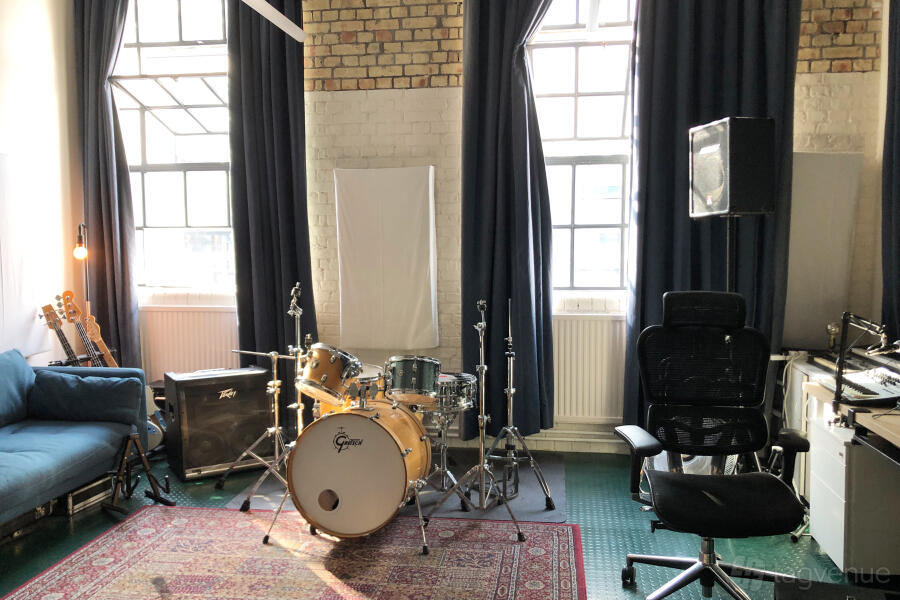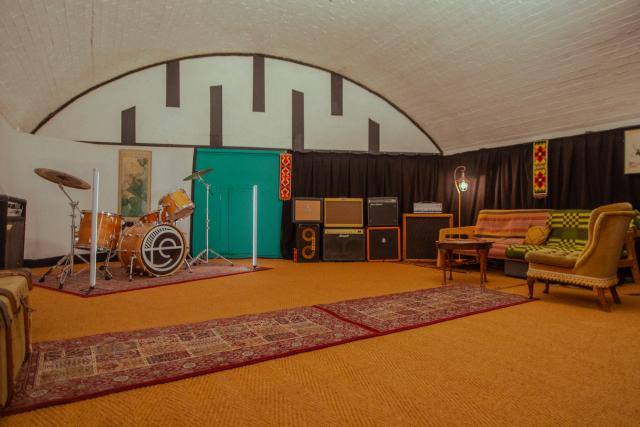Top Recording Studios in London
Looking for a recording studio for hire in London? The city is known for its vibrant and varied music scene, as well as its world-famous performance venues. Well-equipped recording studios, much sought after by bands, singers, actors, songwriters, and podcast hosts, are wonderful spaces for recording music, as well as recording podcasts and theatrical performances. Here at Tagvenue, we’re sure to have something that meets your specific creative requirements. So what are you waiting for? See how quickly you can find the perfect recording studio today!
-
from £15
hire fee / per hourBook nowMyStudioLdn
7 guestsMyStudioLdnBrent Cross, London#Supervenue
IIt’sfehin A.
“Very cosy, tidy and well equipped studio, i’d definitely book again.” -
from £20
hire fee / per hourBook nowMyStudioLdn2 Recording Studio
10 guestsMyStudioLdnBrent Cross, London#Supervenue
AAmir M.
“Everything was as described and seen in photos - I cannot recommend this space enough” -
from £35
hire fee / per hourBook nowAB Studio
4 guestsAB StudioTooting Bec StationTooting, LondonLLmaccana
“I loved this podcast studio! William was there on hand and was really kind, and made me feel at ease.” -
from £84
hire fee / per hourBook nowPremium West London Studio
20 guestsQube West - Warehouse Event SpacePark Royal StationActon, LondonJJonathan M.
“I loved the dining area that is available to all people using the venue. Staff were friendly and helpful.” -
from £30
hire fee / per hourBook nowEntire Studio
8 guestsBrixton Recording StudiosBrixton StationBrixton, LondonMusic recording studio, podcast recording, production, film and radio voice overs and live band rehearsal space.Entire -
from £126
hire fee / per hourBook nowPodcast Studio 1
6 guestsPodshop Studios - Worship StreetOld Street StationHackney Borough, London#Supervenue
EElla D.
“Spike was amazing and so professional. It’s just the perfect space for podcast recording.” -
from £25
hire fee / per hourBook nowAmazing Podcast Studio
8 guestsMangoStudiosLDNFinsbury Park StationFinsbury Park, London#Supervenue
CClive T.
“Great studio, great vibe. Really enjoyed meeting the team and will certainly book again!” -
from £100
hire fee / per hourBook nowIsle Of Pods Podcast Studio
3 guestsPodcast Recording StudioCanary Wharf StationCanary Wharf, London#Supervenue
LLiam V.
“I was low‑key stressing about London noises, but it was so quiet I literally heard nothing—mind blown!” -
from £25
hire fee / per hourBook nowWhole Studio
8 guestsWest London Music StudioNorth Acton StationActon, London#Supervenue
MMegan N.
“Awesome studio, great value for money and very helpful sound engineering! will be recommending to others !!” -
from £68
hire fee / per hourBook nowSSL ROOM
12 guestsIMHOTEP STUDIODollis Hill StationWillesden, London#Supervenue
Imhotep Studios is located on a quiet residential road in North West London. We offer recording studios, podcasting suites, a DJ room, a Green Screen infinity cove, and photographic studios. -
from £45
hire fee / per hourBook nowLA X 21 Podcast Studio
5 guests21SohoTottenham Court Road StationSoho, LondonPPaul S.
“The venue is in a convenient location. We would se it again. Good sound proofing” -
from £16
hire fee / per hourBook nowStudio
15 guestsMustard Seed Music StudioStratford StationWest Ham, London#Supervenue
MMax T.
“Dom was fantastic in terms of making recommendations and getting the recording sounding great in quick time.”
- 1
- 2
- 3
- ...
- 8
Popular filters
Budget
Event Type
Area type
Venue type
Accessibility features

FAQs about Top Recording Studios in London
In London, prices of recording studios average £55 hire fee per hour. The cost depends on capacity, location, and equipment available. Some spaces may offer lower prices on certain days of the week, so make sure to keep an eye out for discounted options. You can find options that offer packages with crew or professional gear, which can also affect the booking costs. Here's a breakdown of price ranges in London on Tagvenue (data from January 2026):
| From £35 | to £99 | hire fee per hour |
| From £540 | hire fee per day |
Based on the popularity and user ratings on Tagvenue (updated January 2026), the best options include:
-
AB Studio at AB Studio in Tooting - rated 5/5
Our user said: ‘100% recommend the studio! The venue is cosy, well equipped and all round perfect.’ -
Premium West London Studio at Qube West - Warehouse Event Space in Acton - rated 5/5
Our user said: ‘I loved the dining area that is available to all people using the venue.’ -
MyStudioLdn at MyStudioLdn in Brent Cross - rated 4.8/5
Our user said: ‘Only the booth is soundproof, the wider space with the desk is not.’
These are the venues within 1.3 mi from central London, available to book on Tagvenue:
-
Podcast Studio at Kennington Film Studios
on 373 Kennington Road - 0.9 mi from centre.
Venue said: The space can cater for any podcast, vodcast, vocal record, and/or live stream project. Our in-house team is ready to support all aspects of your booking or dry hire and away you go! -
Podcast Studio at Joy Peddlers Pod Studio
on 39 Brixton Road 3rd Floor - 1.2 mi from centre.
Our user said: ‘Friendly and professional team.’ -
Stylish Podcast Studio at Many Rooms Studios
on 5 Havelock Terrace Hewlett House - 1.3 mi from centre.
Our user said: ‘Google speaker - I didn't remember my music/ speaker until I was already making my way to the studio!’
You can find music and recording studios all over Greater London. In North London, Dalston, Tottenham, and Islington have plenty of options for affordable music studios and blank canvas spaces. The city centre is also full of great music studios in many price ranges. Neighbourhoods such as Soho and Westminster have a large variety of studios for hire.
A well-equipped studio will include a main workstation for mixing your audio in real time, a soundproof studio booth for clean-sounding vocals, and many different microphones, instruments and any studio gear you would need during a session.
Your Guide to Hiring Recording Studios in London
London has a rich music history—just think of Abbey Road, where legends have recorded their biggest hits. With so many creative districts across the city, it’s no surprise that top-quality recording studios are everywhere. Whether you’re laying down your first track or fine-tuning an album, there’s a studio in London that fits your style and budget.
What to Consider When Booking a Recording Studio
Before you book, here are some key things to keep in mind:
- Cost – Recording studios charge by the hour, day, or session. Some offer discounts for multi-day bookings or off-peak hours (weekdays are often cheaper). If you’re on a budget, Tagvenue makes it easy to find an affordable option.
- Location – If your band members are coming from different areas, look for a studio near a major transport hub to make travel easier.
- Equipment – If you need specific gear, instruments, or software, check what’s included and know if you can rent additional equipment if needed.
- Food & Breaks – Long sessions mean hungry musicians! Some studios offer catering, or you can pick one near great food spots. Also, a breakout area is a plus.
Top 5 Types of Sound Studios Available in London
Whether you’re looking for a well-connected studio in the city centre, or looking to get inspired in London’s cultural districts, such as Camden or Hackney, here’s our list of the 5 types of recording studios that are available for hire:
- Music Studios – Perfect for recording songs, demos, or voice-overs. From budget-friendly music studios in London to recording spots with high-end facilities, you’ll find a studio that fits your needs.
- Podcast Studios – With podcasts booming in the UK, dedicated recording spaces have popped up all over London, offering professional sound quality for your show.
- Photo & Video Studios – Need the right backdrop for your shoot? There are plenty of small studios designed for filming and photography.
- Blank Canvas Spaces – These flexible venues can be set up for various types of recordings, whether you need a quiet space for voice work or a custom setup for music production.
- Rehearsal Halls – Dance studios, small theatres, and open creative spaces can double as recording studios in London. They are great for music videos, performances, and large-scale projects.c
How to Record a Demo With Your Band in London
A well-produced demo can help you grab the attention of record labels. Here’s how to make the most of your recording session:
- Book the right studio – A professional recording studio gives you the high-quality sound you need. Set a budget and consider spreading your sessions over a few days to avoid burnout.
- Come prepared – Rehearse your songs until they’re tight. The better prepared you are, the less time (and money) you’ll spend redoing any takes. Get a good night’s sleep before your session; you’ll want to sound your best.
- Make it memorable – Labels receive countless demos, so think beyond just the music. A unique format or standout packaging (even a well-designed CD cover) can make your submission more eye-catching.
How to Rock Your Recording Session in London
You’ve booked your dream studio, now it’s time to make the most of it! A recording studio is a professional space, and a little preparation goes a long way in keeping your session smooth and productive. Here’s how to nail it:
- Be on time – Studio time is valuable. Arrive at least 15 minutes early to tune instruments, set up, and go over the session plan.
- Respect the gear – Studio equipment is delicate (and expensive). Handle everything with care, keep food and drinks away, and if you’re unsure how to use something, ask the engineer.
- Manage the volume – Loud amps are great, but excessive noise can disrupt other sessions and damage equipment. Use headphones for personal monitoring and keep conversations at a reasonable level.
- Communicate clearly – Work closely with the sound engineer. Discuss your vision, share reference tracks, and stay open to their advice—they’re there to help you get the best possible recording.
- Clean up after yourself – Pack up your gear, dispose of trash, and leave the space as you found it. A tidy studio is a happy studio!
- Bring the essentials – Don’t forget sheet music, lyrics, extra strings, or anything else you might need. Staying hydrated and bringing snacks can also keep your energy up during long sessions.
The Best Recording Studios in London
Whether you're recording a podcast, producing music, or shooting a video, London has top-tier studios for every project. Here are some of the best options available for hire:
- Podshop Studios (East London) – A professional podcast studio for up to 5 people, with high-quality Rode microphones, headphones, and a Rodecaster Pro mixer. The space is fully soundproofed for crisp audio recordings. Prices start at £55 per hour.
- West London Music Studio (West London) – A well-equipped music studio for up to 6 people, perfect for recording, rehearsing, and mixing. It offers professional microphones, audio interfaces, and great acoustics. Available from £35 per hour.
- AB Studio (North London) – A professional music recording studio for up to 8 people, with high-end Neumann microphones and a Universal Audio interface. Great for full-track production, mixing, and mastering. Prices start at £45 per hour.
- Finchley Studio London (North London) – A cosy recording space for up to 4 people, ideal for music production, voiceovers, and content creation. It offers a relaxed yet professional environment at an affordable £30 per hour.
- Green Screen Infinity Cove (West London) – A high-end video production studio for up to 10 people, with a seamless green screen infinity cove and top-tier lighting. Perfect for music videos and creative visual projects. Prices start at £100 per hour.
People also search for
Recording Studios in nearby suburbs
Recording Studios in other cities
Verified Reviews of Recording Studios in London
Page last updated in January 2026
To provide you with relevant information, our pages are refreshed using an algorithm that aggregates real-time data, including bookings, reviews, and venue updates.

